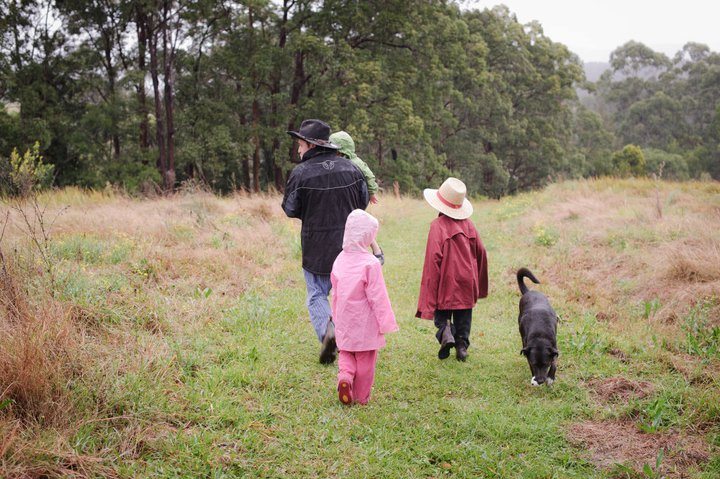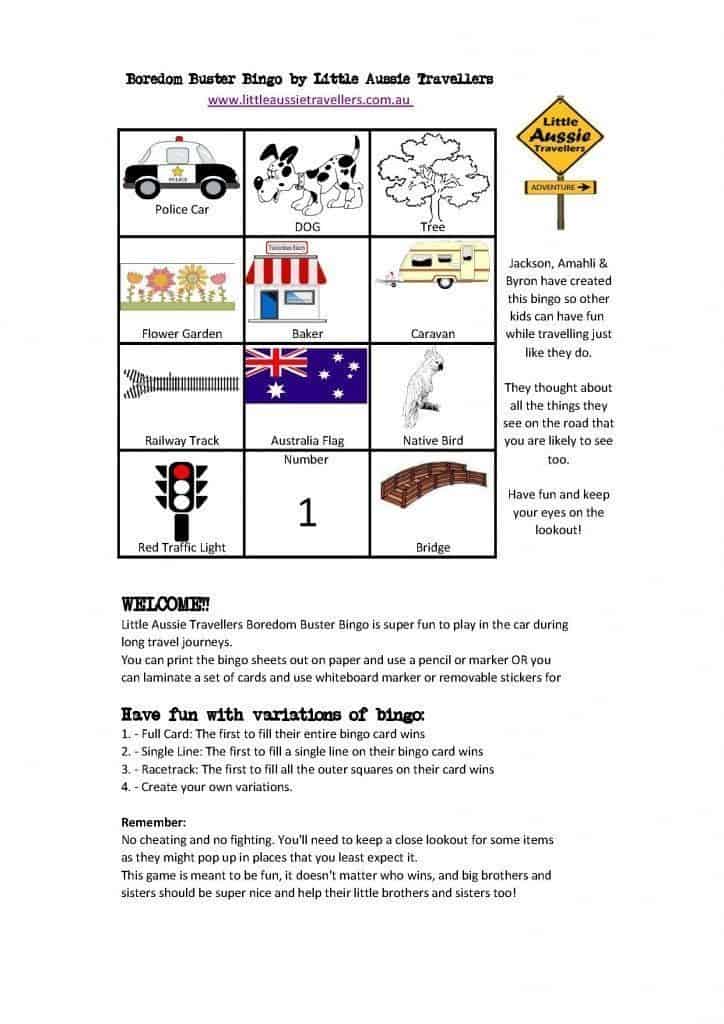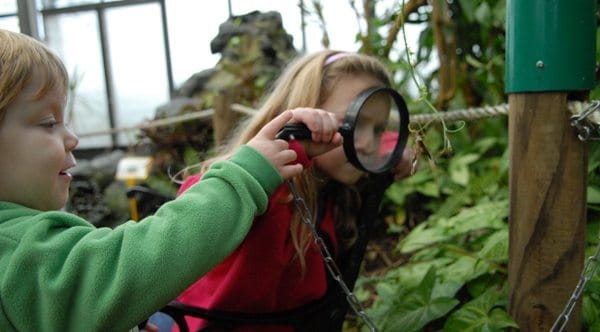
by Loreena Walsh | Education
So you’re heading off on an Australian family holiday, and while you know it will be fun and exciting for the kids, you’re wondering how to take advantage of the amazing opportunity to help them learn without even realising they’re doing so. The great news is that travel is a great way to teach kids about everything from general life skills to history and mathematics.
The greatest thing about learning through travel is the fact it’s so far removed from the boring textbook style experience they’ll get elsewhere, they probably won’t even realise they are on an educational ride of their lives.
So how do you introduce child learning through travel? Here are a few tips.
1. Give your children a travel journal.
Travel journals are FUN and they aren’t just for older kids either! Children of any age generally love to draw, write or share their own insights into their lives when given the chance to be creative. Encouraging them to use these interests while on holidays or family road trips, is an easy way to guide their interests toward fun, educational outcomes.
There are lots of great options for kids travel journals, and it doesn’t need to be an expensive process. To keep things simple, our tips for creating a travel journal for your kids are:
- Purchase a hard cover notebook from the supermarket, discount store or newsagency. An A5 size is portable and a great size to have in the car.
- Before you leave let the kiddos decorate their journal using stickers, protective contact book cover or any other way they like.
- Guide your children with the types of things to record in their journal but don’t enforce.
Ideas for travel journal content for your kids:
- Draw maps of places you visit, places you stay, even your holiday accommodation.
- Draw pictures of places, buildings, attractions, wildlife and anything else they see.
- Leave blank pages when they write about attractions or the day’s events, so they can glue photos in when they get home.
- Collect tickets, brochures and souvenirs that can be used to add texture and interest to the journal.
2. Track Your Holiday On a Map
This is a really fun thing to do with children of all ages. Get a suitable map that shows both your home and your road trip destinations. Before you leave home, place a marker on your home town/city then, depending on the age of your children, help them to plot your travels on the map, or allow them to do it.
You can either do this as a family, or give the kids a map of their own. You don’t need to buy expensive maps for this, you can simply print a map out from the internet before you leave.
After or during your trip, for older children, this gives them to opportunity to research distances between towns etc. It’s also great for them to plot departure/arrival times, stop times and locations and fuel expenses. By turning this into a fun adventurous exercise this helps your child learn a whole range of life skills and mathematical skills without it being boring and mundane.
3. Give your children a camera or video camera to use.
Wondering how using a camera can be educational. This exercise is lots of fun for children of all ages.
Digital cameras work best for this as children can see their artistic vision unfold right before their eyes, and there are no high costs associated with needing to print photos in order to see them. Recording their holiday by taking photos or capturing video of their experiences, allows your child to express their creativity, but it also assists them with language skills such as recounts (explaining something that happened or they’ve experienced in the past) as well as storytelling, art and culture.
Once you return home from your trip (or if you’re on the road long term, at any time) continue the encouragement of self-expression by allowing your child to create their own photo album. Allow them to organise and collate their images into pages in an album or scrapbook, and work closely with them to help them document their artwork with written recounts or descriptions. Alternatively, help them to create a collage using either just their photos, or photos, words, travel brochures etc.
Just Have Fun With It!
You’ve now read just a few ideas of how your family travel experiences can be educational for your child. Don’t be afraid to have fun, try different ideas and follow the lead of your child. Of course researching places, people, animals and other attractions that they have seen is a great way to broaden their knowledge and even if they don’t write it down, talking about it as a family is lots of fun and sometimes we underestimate the power of a simple conversation with our children and what they can learn from it. So if you feel that you’re time limited or your children won’t be interested in the options we’ve listed above, be sure just to talk, share and enjoy.

by Loreena Walsh | Family Travel
Australia is known as the lucky country, and for good reason, for those of us who live here, we really are blessed with an amazing gift. Sure, there’s things that aren’t how we wish them to be, but for the most part we’re blessed with AMAZING Australian nature and wildlife, a great laid back culture, great healthcare, great education and the opportunity to live our dreams if we really want them enough. I’m not going to get into arguments about what may be lacking in the areas of health care and education, and you wouldn’t either if you really took time out to compare our standard of living to many countries in the world!
With that being said, I often wonder if our country is so amazing, why is it that so many people I know have travelled overseas yet never visited Kakadu, Uluru, The Kimberley’s or any of the other amazing destinations we have right on our doorstep? There are people risking their lives for the chance to live in our country, and yet so many Aussies tend to flit off overseas for their family holidays. What happened to the great Australian family holiday? The one where you take a family road trip and explore what our rich red soil has to offer?
There are so many reasons to stay home and travel Australia with your kids and skip the overseas holiday for now, here’s our top 5 reasons for travelling Australia with your family 🙂
- 1. You’ll discover just how little you know about Australia and you’ll learn heaps! In the days when the furthest I’d ventured from home was 4-5 hours, I honestly thought I knew what Australia was about. Oh boy how wrong was I! Venturing into different states and regions of Australia is sometimes comparable with exploring a new country! There is a vast divide between what life is like in Cities or coastal regions vs life in remote communities and outback towns. There’s even a huge difference between our Capital Cities. People speak a little differently, have different stories, and different issues, yet we’re all uniquely Aussie and that connects us all.
- 2. You’ll support local industry and help keep people in jobs. Australia has faired reasonably well in in respect to the Global Financial Crisis, but that doesn’t mean that some industries haven’t suffered. Our healthy economy means that it’s become cheaper for Aussies to travel overseas and more expensive for people to visit us from abroad, that makes for a tourism industry that’s feeling the pinch. If you can’t afford to stay in 5 star hotels, there’s plenty of ways to make travelling around Australia affordable, by camping, or choosing family cabins, caravans or even camper trailers you can spread your money further than otherwise possible. Every little town you visit on the way, every small business you support will be oh so grateful!
- 3. You’re children will be inspired! This is especially true if you’re living in a large suburban area or city. Heck we live in regional Australia and our kids are still blown away each time they explore a new corner of our country. Children are inquisitive by nature, they love to discover and explore and there’s lots of opportunity to do that on the road. Not only will they learn so much about the country that’s nurturing them, they’ll learn about other cultures too. You’ll meet lots of people travelling from a wide range of countries on the road, and it’s great to listen to their stories and lifestyles back in their homeland.
- 4. Bridge the Gap! Theres no excuse not to visit friends in distant places if you’re travelling Australia on your own schedule. Take the opportunity to do numerous road stops on the way, discover all the great towns and landmarks and treat yourself to visits with people you don’t get to see often. Staying with friends and family can save you money too.
- 5. REALLY get to know your Family! Not only will travelling give you a chance to reconnect with those you’ve been missing, but it’s also one of the best opportunities to get to know your own family. In our busy schedules it’s easy to pretend we’re spending time together, but more often than not it’s just fleeting moments of chit chat. Living on top of one another brings about amazing opportunities to not only get to know your children, it also allows you to learn and explore together creating memories that will last a lifetime and help shape your children for the future.
While I absolutely understand the desire to travel overseas, I truly feel that people often push aside exploring their own country simply because it is there, and they feel it will always be there. Life truly is too short to not see Australia, and I can’t recommend enough hitting the road with your children, no matter their age to open your hearts and minds together to forge memories that are unforgettable!

by Loreena Walsh | Family Travel
It can be difficult trying to occupy children for a long time on car rides, believe me in our journeys travelling Australia we’ve learned the hard way! So that’s why we’re bringing you:
Boredom Busters Bingo – By Little Aussie Travellers
We got together with the kids to create 9 different bingo cards that can be printed ready to take along on your next long drive, you’ll see an example picture below along with a download link to download a .pdf file of the full set of 9 bingo cards.
These bingo cards do have a little bit of an Aussie theme, but if you’re visiting our website from another country, you’ll just need to glue a picture of your own country’s flag over the top of the Australian Flag before starting out on your journey.
Our tips are:
Download the Free Kids Activities Printable by clicking on the picture below.
Print them out, and either use a pencil or crayon to mark off your squares as you find your items, or for more long lasting cards, laminate each one individually and use small stickers or white board markers to check off each square.

We hope you like our bingo cards, feel free to spread the word, and we’d love any feedback you have or pictures of you using them 🙂

by Loreena Walsh | Education
I have learnt from experience that it is our own preconceptions of what education SHOULD be that gives us the fear of failing. It should be the excitement of what education COULD be that gives us encouragement.
Note: Legislation varies across each Australian State that may restrict long-term travel while homeschooling, please familiarise yourself with your State legislation.
Last post I introduced you to the education options for children travelling Australia in the short term or long term. While most people understand the need to continue to teach their children on the road, most don’t understand the difference between homeschooling and distance education. Now we’ve touched on that (and if you didn’t read the first post, just click on the link at the start of the paragraph) it’s time to go a little further into explaining the pro’s and con’s of each styling of education and help you make a more informed decision about which might best suit your family.
What is Homeschooling?
To re-cap on this subject, homeschooling is the education choice that allows parents to create and develop their own curriculum based on their intended travels, their resources and their child’s learning style. Homeschooling is a personal journey for each family, and this is the case for homeschoolers who teach from home as well as those on the road. No two families homeschool identically, which is fine, because no two families are the same, nor are there any two children who are the same, so it’s a flexible and robust style of learning.
Homeschooling requires that the parent, or educator develops their own curriculum ensuring that the child is covering all the essential “Key Learning Areas” or KLA’s. These include things such as Math, Science, English, Personal Development, Art etc, etc, etc. This curriculum can be developed with the use of pre-purchased curriculum or items, or developed independently using resources or information available from any suitable resource.
Advantages of Homeschooling for Travellers?
1. Travel Plan Flexibility
One of the greatest advantages of choosing homeschooling vs distance education for travelling families is the extra flexibility possible with travel plans. While many families set off on their Australian travel experience with some idea of where they would like to go, and a rough timeline, it’s always inevitable with travel that even the best timelines and plans can get off track. This is especially so when there’s so much to see and do in Australia that you may not have even heard of before setting off. By choosing to Homeschool, you’re in charge of all learning without having to be in specific places, have internet access or postal access at all times, this means when you fall in love with a region, or you find extra places to discover, you are able to change plans as you desire and not worry about having to post off the week’s school work or be within internet service for conference calls etc.
2. Learning Plan Flexibility
As already mentioned, homeschooling parents are also the curriculum developers. Regardless of whether homeschool curriculum development is undertaken via a purchased curriculum or an entirely hand crafted one, having the flexibility to modify your curriculum to enhance and blend with your travel experiences is a huge benefit of homeschooling. Homeschooling allows you to cover subjects that your child understands faster, it also allows you to take advantage of your location to further research or develop understanding on specific subjects. For example if you’re studying history and happen to be holidaying in Darwin, it’s a great opportunity to research and learn about not only war, but also cyclone tracy and these subjects can be blended into the learning schedule when most suitable, unlike distance education which requires you to stick to prescribed learning.
3. Set Your Own Pace
With the benefits of being able to modify schooling to suit your travel plans, and also modify your learning plan to suit your current location, another great benefit of homeschooling is that you can set your own pace. Some days of travelling can be hectic and tiring, and trying to fit schoolwork into days such as that can be a negative experience for both teacher and student. Travelling is about exploration and experience, so having to be tied to schoolwork that is not particularly relevant to that exploration and experience can lead to frustration. A huge benefit with homeschooling is that you are able to set your own pace. For days when you’re out enjoying, discovering and learning there may be little or no prescribed school work. That isn’t to say that there isn’t a whole lot of learning going on, generally there is, it’s just not in the sit-down school book sort of way! For days where you’re staying put in one place for a few days, taking things more slowly, then it’s easier to play catch up and work harder on sit-down school work and to spend time recording and collating that was done on the previous days’ exploration and discovering.
An important thing to remember about homeschooling is that it is education of a different kind. Yes there are school books, lessons on maths, english, science etc for the most part, but homeschooling recognises that not all learning is best undertaken through books, or through a teacher/student/classroom situation. Travel introduces children to a world of learning that can’t be replicated any other way, and it’s important not to stifle that learning opportunity. Homeschooling helps to embrace and enhance the travel journey by allowing parents and children to seek knowledge in their newly discovered surrounds, and to reflect that knowledge back into subjects that may otherwise be covered in textbooks.
4. Greater parent/child connection
As parents, once our child reaches school age we lose some control over their outside influences and their learning. Many parents I know are concerned over not only what their children are learning at school, but possibly more importantly what their children aren’t learning at school. By taking the time to work with your child to help them learn, you may be surprised by what you learn about your own child. As them what they like to learn about, how they like to learn and what things they love or hate about school. Make the travel time you have together an enjoyable experience for you both, while taking the time to encourage a love of learning that is often lost within the classroom environment. Having close time with your child to be able to teach them what you believe is important is a great way of reconnecting and ensuring that you are raising your child how you intend to, something that we can’t always keep a track of in our busy society and lives on a day to day basis.
Summary of Homeschooling Advantages for Travelling Families
- Greater travel planning flexibility
- Greater learning plan flexibility
- Setting your own pace
- Greater family connections

FURTHER INFORMATION IN THIS SERIES:

by Loreena Walsh | Education
In this series we’re covering the essential information that you need to educate your children on the road while travelling Australia. It’s an overwhelming subject that can be made even more difficult due to the huge variation in rules and regulations between each State and Territory.
Here are the all important links to distance and home education information for each State in Australia. Generally you will fall under the legislation of the State in which you are living in at the time of withdrawing from mainstream schooling, although this may change if you are travelling long term and decide to stay around a particular state for extended periods. If you have any questions please do not hesitate to contact me.
Use these links to research information that is applicable to your home state.
In some states, homeschooling is not an option while travelling long term, although exemption from school is sometimes granted for up to 100 days, otherwise distance education will be the only option available to you.
NSW Homeschool & Distance Education Information For Travelling Families
NSW Dept Education Homeschooling Info for Travellers
NSW Dept Education Distance Education for Travellers
VIC Homeschool & Distance Education Information For Travelling Families
VIC Dept Education Homeschooling Info for Travellers
VIC Dept Distance Education for Travellers
QLD Homeschool & Distance Education Information For Travelling Families
QLD Dept Education Homeschooling Info for Travellers
QLD Dept Education Distance Education for Travellers
NT Homeschool & Distance Education Information for Travelling Families
NT Dept Education Homeschooling Info for Travellers
NT Dept Education Distance Education for Travellers
SA Homeschool & Distance Education Information For Travelling Families
SA Dept Education Homeschooling Info for Travellers
SA Dept Education Distance Education for Travellers
WA Homeschool & Distance Education Information for Travelling Families
WA Dept Education Homeschooling Info for Travellers
WA Dept Education Distance Education for Travellers
TAS Homeschool & Distance Education Information for Travelling Families
TAS Dept Education Homeschooling Info for Travellers
TAS Dept Education Distance Education for Travellers
ACT Homeschool & Distance Education Information for Travelling Families
ACT Dept Education Homeschooling Info for Travellers
ACT Dept Education Distance Education for Travellers
FURTHER INFORMATION IN THIS SERIES:

by Loreena Walsh | Education
Want to travel Australia? When it comes to the kid’s education, travelling Australia with kids for any extended amount of time can be confusing for parents who often wonder what will happen to their children’s schooling. I’ve mentioned before, I use the terms homeschooling and distance education interchangably on that it can work well for your family also when spending time travelling, the first step is understanding the types of schooling available for travelling families, and then deciding which option suits you.
Education Options for Travelling Families in Australia
When investigating education options, the first thing that comes to mind for most parents is homeschooling. While it’s true that education when you’re travelling as a family takes place as a homeschool style scenario, in reality there are 2 options available and which one you choose is dependent very much on both your needs as a family, and the trip you are planning to undertake.
In Australia, there are 2 systems for children to learn outside of the generalised school environment:
- The first being homeschool (this option is restricted in some states and unsuitable for long term trips) and
- the second being distance education.
Without prior knowledge, many parents don’t realise that while the 2 options sound the same, there are actually huge variations in the learning style, resources, requirements and outcomes of each education choice. More than anything else, these 2 choices will control the flexibility especially in, time, curriculum and learning style of the child.
What is Homeschool & How Does it Apply to Travelling Families?
Homeschool is generally the practice of a parent or caregiver educating a child or children based on a curriculum of their choice. This curriculum can be largely chosen to suit the child’s learning style, interests, strengths and weaknesses, and is often tailored specifically to each individual child.
Homeschooling for the travelling family requires both pre-planning and organisation, but as a bonus, it allows a much greater flexibility as to when and how schoolwork is achieved. Rules and regulations vary from state to state so there may be an application process and approval needed or it may just be advising the education board if that. I’ll try to cover the current basic regulation information for each state in the near future and upgrade this overview with links to those sections.
What is Distance Education & How Does it Apply to Travelling Families?
Distance Education is a process where each student is registered with the Department of Education in their state and receives their curriculum and educational activities pre-organised and allocated. The child will follow a pre-designated work routine and may also link up with teachers or other students via internet, phone or other means.
Distance Education is a much more rigid form of education on the road. It allows for much less flexibility which means, some families who are travelling choose this option but later switch over to homeschooling as the workload and inflexibility becomes too great. There are other families however who love the fact that everything needed is provided, and it can give great structure.
What are the Differences that Most Affect Travelling Families?
The main difference between homeschooling and distance education is the sometimes rigid structure. It is often feels more suitable to the travelling lifestyle to undertake a homeschooling journey while exploring Australia for extended periods. There are several reasons for this, with the main ones being:
- Homeschool can enhance the travel experience, by allowing children to focus on learning about the culture and environments they are experiencing, without having to focus on irrelevant subjects at that time. This is not to say that children aren’t still learning fundamentals, they may just be learning them in ways other than prescribed worksheets and texts. Sticking completely to classroom style learning can deny travelling children the experience of a more worldly style of learning.
- Distance Education can present difficult logistical problems for a travelling family. The requirement to be able to receive and send postal packages of schoolwork, and often attend link ups with teachers and other students can dictate where a family can travel and how long they will have to stay. Keeping in mind that many areas of Australia have limited access to good internet, and extended postal times, issues such as these can cause major hassles and remove some of the spontaneous fun of exploring the country.
- Homeschool takes a little more pre-planning. It may seem difficult, but it isn’t once you gather the tools and resources that you need. Most travelling families will focus heavily on the basics of reading, writing and math, and allow the other subjects to develop naturally as a part of their travels. There are great books available in your local bookshop that will help you to teach subject materials appropriate for your child’s skill level, as well as some great online resources too.
- There are some really great distance education programs available to families, for example NEPSODE in Port Macquarie, NSW offer a flexible learning experience for travelling children, the key is to talk with the distance education provider to understand the requirements before signing up.
How to Choose Which Style of Schooling Suits Your Travelling Family?
The choice for how you educate your children is absolutely personal and no matter which option you take, there are amazing resources available, and the internet is such a great place for gaining assistance and information. Some questions to ask yourself when choosing the best education options:
- How long will we be travelling?
- Would we prefer flexibility or school style structure?
- Would we rather freedom or being tied to the post office and schooling assignments?
- Are we happy to pre-plan or would we rather have everything provided ready to go?
- What are the requirements for homeschooling in our home state?
- What are the requirements for Distance Ed. in our home state?
- What experience would suit our child better?
- What experience would suit our family better?
It’s important to consider style and type of learning you would like your children to undertake as they are exploring this amazing country, as well as the lifestyle your family is hoping to achieve during your travels, as well as maintaining a well rounded education for your children. One huge benefit of distance education is the fact that curriculum and materials are provided, so parents only have to implement and supervise the learning, and not create the program and materials.
FURTHER INFORMATION IN THIS SERIES:













